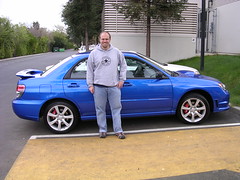Who's running against your current congressman?
I live in California's 24th district, where I am represented by
republican congressman Elton Gallegly. (Also see the now out-of-date but still entertaining
Gallegly Watch). It's a
heavily republican district(pdf), but I still wanted to find out who I could support to run against him.
Thanks to
the DCCC, I now know that there are three Democrats running in the primary:
Jill Martinez,
Mary Pallant, and
Brett Wagner. Excellent, and I wish them all luck.
Tags:
jill martinez,
mary pallant,
brett wagner,
elton gallegly,
california 24th district,
california,
politics
NBC: Please add bobsled "ghost" images

In most modern racing video games, you can race against a "ghost" image of your previous best time. It's a great feature, because you can see where you gained and lost time on the track.
NBC, please add ghost images to your bobsled coverage. And your speed skating coverage. And any race where the competitors aren't racing head-to-head. If the technology is too difficult, at least add a moving line showing the ahead/behind status of the current racer.
Update 2/26/2006: Craig pointed out that the guys to do this are "
Sportvision"; they already have similar technology in use for other sports. (They add the virtual country flags to the speed-skating coverage, for example.)
Tags:
olympics,
bobsled,
bobsleigh,
television,
mario kart
Dumb is not a character flaw, and smart is not a virtue.
Now that it's clear that almost everybody hates the U.A.E. running our ports, Bush goes with the
"I was ignorant and misinformed" excuse. Again. And he will most likely get away with it. Why? Because far too many people sympathize with ignorance. "I didn't know that the U.A.E. was taking over those ports, either! Bush is just like me, a regular guy!"
I despise this change in our culture: The buck stops nowhere. Everyone's opinion is equally valid, no matter how ignorant or misinformed. Feelings are more important than facts. Dumb is not a character flaw, and smart is not a virtue.
Esquire magzine sums it up perfectly:
Greetings From Idiot America.
The rise of Idiot America is essentially a war on expertise. It’s not so much antimodernism or the distrust of intellectual elites that Richard Hofstadter deftly teased out of the national DNA forty years ago. Both of those things are part of it. However, the rise of Idiot America today represents, for profit mainly, but also, and more cynically, for political advantage and in the pursuit of power, the breakdown of a consensus that the pursuit of knowledge is a good. It also represents the ascendancy of the notion that the people whom we should trust the least are the people who best know what they’re talking about. In the new media age, everybody is a historian, or a preacher, or a scientist, or a sage. And if everyone is an expert, then nobody is, and the worst thing you can be in a society where everybody is an expert is, well, an actual expert.
Tags:
politics,
culture,
idiot america
My new car is my excuse for lax blogging
I've been a slacker with the blog recently, but as you can see, I've been preoccupied buying a new car.
A 2006 Subaru WRX.
"It is so choice. If you have the means, I highly recommend picking one up".There was one problem with the car: it's manual transmission, and I don't know how to drive stick. My friend Craig was cool enought to give me an hour-long lesson in his car, and I read a
web tutorial on driving manual transmission, but still...the ride home from the dealership, during the heart of rush hour, was a white-knuckle thrill-a-minute ride. When I finally pulled into the car port and got out of the car, I was so amped on adrenaline that my legs were trembling.
I drove around quite a bit this weekend, and I imagine myself to be getting better, slowly. Of course, on my last ride, I may have regressed a little bit: I had two ugly stalls in a parking lot.
Scalzi's writing tips.
Ok, I have blogger burnout again, so instead of actually writing something, I'll just link to
John Scalzi's list of
"Writing Tips for Non-Writers Who Don't Want to Work at Writing".
He mentions the overuse of exclamation points. He doesn't mention that if you're selling something on Ebay, you've got to use exclamation marks!
Lots of them!!! They are so common that your ad will look weird if you don't use them!!!
I just need a way to remember that I'm not on Ebay all the time.
Tags:
scalzi,
john scalzi,
writing,
blogging,
exclamation points
My Olympic moment: prank calling Bonnie Blair's house

Since the Winter Games are starting, it's time to tell my personal Olympic moment. It happened during the 1992 Olympic games in Albertville, France. I was a freshman attending
college in Champaign, Illinois. Champaign also happened to be the hometown of speed skating gold-medal hopeful
Bonnie Blair.
Champaign loved Bonnie Blair in a way only a small town can. Shops had handwritten "GO BONNIE!" signs in the windows. The local news had multiple stories about Bonnie every night: chatting with Bonnie's family, a report on what Bonnie was doing for fun in France, interviews with Bonnie's trainer, and technical information on Bonnie's equipment. The police even put Bonnie Blair stickers on their squad cars. Champaign was Bonnie's town.
And don't get me wrong: I loved Bonnie Blair as much as the rest of Champaign did. Bonnie Blair had that midwest earnestness and charm that made her a perfect hero. She was an amazing athlete, but somehow managed to keep that "aw, shucks" modesty that made everyone want to sing her praises even more.
During the speed-skating finals, I was hanging out with friends in the dorm room of my friend Brian when the news came in over the radio: Bonnie had just won her first medal! Brian's immediate reaction was, "We've got to congratulate her family!" He picked up the phone book and flipped to BLAIR.
"You're not really going to call her family, are you?" I asked.
"Why not?" He dialed and put the call on speakerphone. When someone picked up, everyone in the room did the logical thing: we started screaming "WHOOOOOOOOOOOOOO! BONNIE! WHOOOOOOOOOOOOO! GO BONNIE!" like the jackasses we were.
They hung up immediately, but I always felt bad. Sorry, Bonnie. Even though we prank called your family, we totally didn't mean any harm by it. You totally rock.
Tags:
bonnie blair,
albertville,
winter olympics,
1992 olympics,
champaign, illinois,
olympics,
sports,
speed skating
Social Security privatization is back on, losers.
Remember the Social Security privatization plan that everybody and their mother (especially their mother) hated last year? And you thought it was gone and dead? Well, as it turns out
social security privatization is ON. ("And there ain't a GOD-DAMN thing you can do about it!"):
Last year, even though Bush talked endlessly about the supposed joys of private accounts, he never proposed a specific plan to Congress and never put privatization costs in the budget. But this year, with no fanfare whatsoever, Bush stuck a big Social Security privatization plan in the federal budget proposal, which he sent to Congress on Monday.
His plan would let people set up private accounts starting in 2010 and would divert more than $700 billion of Social Security tax revenues to pay for them over the first seven years.
If this comes as a surprise to you, have no fear. You're not alone. Bush didn't pitch private Social Security accounts in his State of the Union Message last week.
Americans didn't want this plan. But lucky us, we're getting it anyway.
Tags:
social security,
politics,
bush,
corporate welfare
Could the NSA wiretap everybody?

Recently, President Bush ordered
the NSA to wiretap U.S. citizens without a warrant. In theory, this order is used only to eavesdrop on terrorists and their associates, but I started to wonder: What would it take for the NSA to record and monitor ALL long distance telephone traffic in the U.S? How expensive would a computing infrastructure to analyze and search all of those phone calls be?
Read more...
Architecture
The NSA doesn't release specifics on their technology, resource allocation, or what they've learned from the Aliens at Area 51. (Kidding!) And what little information is out there could just as well be disinformation. There's going to be some handwaving in this article. Indeed, there are some relevant technologies, such as special-purpose ASICs and vector processors, that I will ignore, but only in the interest of coming up with a worst-case estimate.
There are several alternative systems one can imagine, but I'm going to model a network of modern CPUs doing the first pass voice-to-text translation. The system would also need to search for suspicious conversations, perhaps by something as simple as keyword searching. On the other hand, there are more sophisticated techniques they could use; the anti-spam community has proven that Bayesian filtering does a great job as an automated first pass for recognizing conversations. Eventually, any conversation flagged would be forwarded to human intelligence analysts.
Phone Traffic Volume
This section analyzes the available numbers on phone traffic; it's a bit dry. If you're bored, skip to the last paragraph in this section.
How much traffic do we need to record? The FCC issues a yearly report on "Statistics of Communications Common Carriers" summarizing phone usage in this country. There's some jargon in these reports but to grossly oversimplify, InterLATA calls are long-distance; IntraLATA are medium-haul calls that don't cross LATA boundaries; and then the closest calls are classified as local.
In the U.S. in 2004 (see page 21), there were 72 billion InterLATA calls, with a total of 602 billed minutes. (Thus the average phone call was 8 minutes 20 seconds long.) There were also 10 billion IntraLATA calls, and 381 million local calls. The FCC doesn't publish minutes for local and IntraLATA calls, but let's assume 8 minutes 20 seconds for those calls, too. That leads us to an additional 88 billion minutes, or a grand total of 689 billion minutes. Let's call it 700 billion.
The international calls for 2004 are listed on page 108 of the same document. There were 7.34 billion calls billed in the U.S., with a total of 42.7 billion minutes. (Average call length 5:48). There were also 3.6 billion calls billed in foreign countries, with a total of 15.6 billion minutes. (Average call length 4:21). There were additionally 1.7 billion minutes listed as "transiting the U.S.".
Approximate U.S. phone traffic, by type| Traffic type | # of calls | Total Minutes | Time Per call |
|---|
| InterLATA | 72 billion | 602 billion | 8:20 |
| IntraLATA | 10 billion | (est) 84 billion | (est) 8:20 |
| Local | 381 million | (est) 4 billion | (est)8:20 |
| International | 7.34 billion | 42.7 billion | 5:48 |
| Transiting the U.S. | - | 1.7 billion | - |
| Total | 90 billion | 750 billion | - |
That was a long walk to arrive at about 700 billion minutes of call time within the U.S., and 60 billion minutes of international call time. (That's 1,330,928.11 years of telephone traffic within the U.S. , and 114,079.553 years of additional international traffic!)
Computing Power
There are real-time continuous voice recognition systems that run well on a 200Mhz Pentium-class computer. Let's wave our hands here and say that this implies that a modern 2Ghz computer could do about 10 times as much work, and recognize voice on 10 streams at once, as well as do some simple Bayesian keyword analysis on the resulting text. This might be an oversimplification of the benefits of a processor speed boost, but on the other hand, the NSA's got a lot of people focused on this type of problem. They've got smart people, and they've been working on similar problems for a long time. The NSA's web pages even claim that the NSA is the "largest employer of mathematicians in the United States and perhaps the world."
A year is 525,600 minutes long, so a 2Ghz single computer can handle 5.25 million minutes of traffic a year.
For U.S. traffic: 700 billion / 5.25 million = 133,181 computers.
For international traffic: 60 billion / 5.25 million = 11,415 computers.
Thus it would take a system of 145,000 computers to scan all of the U.S. and international phone traffic. That may sound like a lot of hardware, but coincidentally, it's about equal to the estimated number of computers that Google had last year!
Caveats
There are other costs associated with such a system, not insignificantly the networking costs to route a copy of all of the phone traffic in the country to an NSA system! (Although apparently they've got quite a sophisticated network built just for that purpose.)
Additionally, the system above just performs a simple scan; in a real system, flagged calls would probably be routed to a more sophisticated system for better analysis. I've ignored the fact that the voice-recognition systems I know about don't cope well with mumbling, two people talking at once, foreign-language translation, and not being "trained" to a particular voice. But once again, these technical hurdles, while not trivial, seem well within the capabilities of the NSA.
The entire voice-recognition system I outlined above would cost about $250 million, at civilian prices. The NSA has an annual estimated budget of $7.5 billion. Every year, they spend over $21 million on electricity alone! With a budget like that, not only is it possible; it would be easy for the NSA to build a system to listen in on every phone call in the country.
Tags:
nsa,
national security agency,
sigint,
wiretapping,
surveillance,
supercomputers,
technology,
telephone,
telephone network,
google
Test
This should be shown always.
Read More...
Here's the rest of the text, hidden on the main page.
 In most modern racing video games, you can race against a "ghost" image of your previous best time. It's a great feature, because you can see where you gained and lost time on the track.
In most modern racing video games, you can race against a "ghost" image of your previous best time. It's a great feature, because you can see where you gained and lost time on the track.

 Recently, President Bush ordered
Recently, President Bush ordered 

